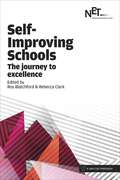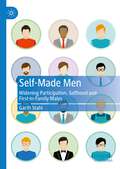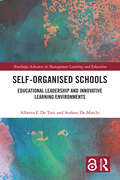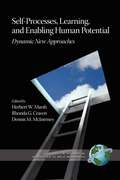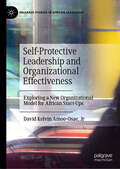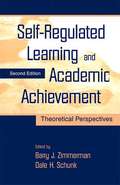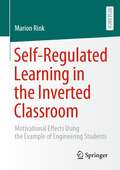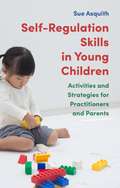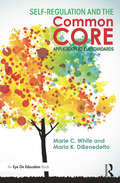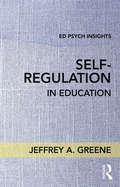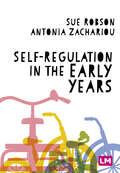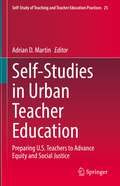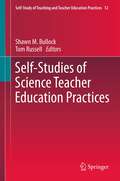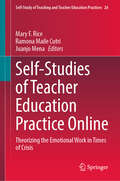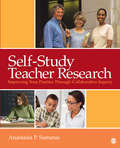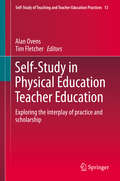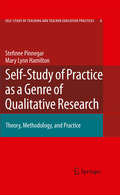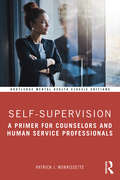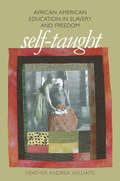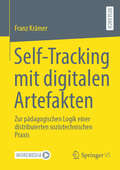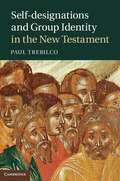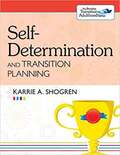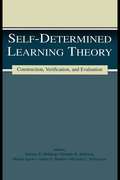- Table View
- List View
Self-Improving Schools: The Journey to Excellence
by Roy Blatchford* Can a school-led system truly become self-improving? * What is the difference between good and great schools? * Who should inspect and regulate? * How should local authorities change? * Is the landscape ahead one of all schools in partnerships? The English schools' system is at a crossroads. This landmark collection of essays brings together some of the country's leading education thinkers and practitioners. Their polemic is intended to help teachers, school leaders, governors, researchers and policy makers think deeply about future directions. 'As a Minister, I would ask which organisation was responsible for resolving a particular problem in education, only to be told: 'Don't worry, Minister - it's no longer the DFE. That is now a responsibility of the School-Led System. They will be delivering it.' Often, when you probed a little deeper, you discovered that the school-led system was nowhere near as well formed and ever present as some Ministers and senior civil servants liked to think.' David Laws 'This is a time of great possibility. Teachers are attempting to do extraordinary things. If we had more courage to shape our schools around what we believe to be a good education, then we could make life so much better not just for teachers but for the students we serve.' Peter Hyman 'For a self-improving system to be truly successful and to have a significant impact, it requires the highest performing schools to be outward reaching and to establish deep partnerships.' Rachel Macfarlane 'A self-improving school system must not become a self-regarding or, worse, a self-protecting school system. The role of external challenge is key to this.' Russell Hobby
Self-Improving Schools: The Journey to Excellence
by Roy Blatchford* Can a school-led system truly become self-improving? * What is the difference between good and great schools? * Who should inspect and regulate? * How should local authorities change? * Is the landscape ahead one of all schools in partnerships? The English schools' system is at a crossroads. This landmark collection of essays brings together some of the country's leading education thinkers and practitioners. Their polemic is intended to help teachers, school leaders, governors, researchers and policy makers think deeply about future directions. 'As a Minister, I would ask which organisation was responsible for resolving a particular problem in education, only to be told: 'Don't worry, Minister - it's no longer the DFE. That is now a responsibility of the School-Led System. They will be delivering it.' Often, when you probed a little deeper, you discovered that the school-led system was nowhere near as well formed and ever present as some Ministers and senior civil servants liked to think.' David Laws 'This is a time of great possibility. Teachers are attempting to do extraordinary things. If we had more courage to shape our schools around what we believe to be a good education, then we could make life so much better not just for teachers but for the students we serve.' Peter Hyman 'For a self-improving system to be truly successful and to have a significant impact, it requires the highest performing schools to be outward reaching and to establish deep partnerships.' Rachel Macfarlane 'A self-improving school system must not become a self-regarding or, worse, a self-protecting school system. The role of external challenge is key to this.' Russell Hobby
Self-Made Men: Widening Participation, Selfhood and First-in-Family Males
by Garth StahlThis book explores how boys from low-socioeconomic status backgrounds disengage from their education, and are resultantly severely underrepresented in post-compulsory education. For those who attend university, many will be first-in-their-family. As first-in-family students, they may encounter significant barriers which may limit their participation in university life and their acquisition of social and cultural capital. Drawing on a longitudinal study of young Australian men pursuing higher education, the book provides the first detailed account of socially mobile working-class masculinities. Investigating the experiences of these young men, this book analyses their acclimatisation to new learning environments as well as their changing subjectivities. The monograph draws on various sociological theories to analyse empirical data and make practical recommendations which will drive innovation in widening participation initiatives internationally. This book will be of interest to scholars interested in widening participation, transitions, social mobility and Critical Studies of Men and Masculinities.
Self-Organised Schools: Educational Leadership and Innovative Learning Environments (Routledge Advances in Management Learning and Education)
by Alberto F. De Toni Stefano De MarchiSelf-Organised Schools: Educational Leadership and Innovative Learning Environments describes the results of the research we carried out at fourteen Italian schools that highlight how there is a positive correlation between the capabilities of school self-organization and the innovativeness of learning environments: in other words, the more self-organized schools are, the more innovative learning environments are. The results of this work are part of the strand of research of bottom-up emergency and self-organization, an extremely fruitful trend as shown by Sugata Mitra, the founder of the Self-Organized Learning Environments, according to whom, "education is a self-organized system where learning is an emerging phenomenon". This book gives new insights on self-organization studies, and most of all, to the idea that change - organizational and educational innovation - sparks from the bottom. This book is aimed specifically at school principals of all levels, scholastic reformers, educational scholars, organisation and management consultants who want to innovate learning and management of learning. These actors will benefit drawing useful examples from more than thirty different learning environments worldwide, fourteen examples of schools that self-organize, two frameworks - and two ready-to-use questionnaires - measuring the innovativeness of a learning environment, and the capability of a school to self-organize. Self-organization is the most fascinating future of innovative principals
Self-Processes, Learning, And Enabling Human Potential: Dynamic New Approaches (Advances In Self Research Series)
by Herbert W. Marsh Rhonda G. Craven Dennis M. McInerneyMaximising self-concept is recognised as a critical goal in itself and a means to facilitate other desirable outcomes in a diversity of settings. The desire to feel positively about oneself and the benefits of this feeling for choice, planning, persistence, and subsequent accomplishments, transcend traditional disciplinary barriers and are central to goals in many social policy areas. International Advances in Self Research publishes scholarly works mat primarily focus on self-concept research and that pertain to a broad array of self-related constructs and processes including self-esteem, self-efficacy, identity, motivation, anxiety, self-attributions, self-regulated learning, learning facilitation, and meta-cognition. The research focus of the monograph series includes theory underlying these constructs, their measurement, their relation to each other and to other constructs, their enhancement and their application in research and practice. Chapters address a wide cross-section of settings, participants, and research areas. This series has a special interest in self theory and research in settings characterised by diversity, such as special education, linguistic diversity, socioeconomic, and cultural diversity.
Self-Protective Leadership and Organizational Effectiveness: Exploring a New Organizational Model for African Start-Ups (Palgrave Studies in African Leadership)
by David Kelvin Amoo-Osae, JrThis book investigates and explores the impact of a self-protective leadership (SPL) style on the organizational effectiveness of start-up businesses within Africa, focusing on Ghana and Kenya. Self-protective leadership is defined as a leadership style that focuses on ensuring the safety and security of individuals and groups through status-enhancing and face-saving tactics. A typical self-protective leader can make decisions, and is free from political influences, but tends to be selfish, ritualistic, and self-centered. The author’s study, presented in this book, demonstrates a surprisingly high preference for SPL among Confucian Asian, Latin American, Middle Eastern, and Sub-Saharan African nations – all of which have a history of colonialism. If this is true, then SPL could be better suited to the business environment in Africa, but particularly amongst start-up enterprises. Examining this phenomenon, and using an explorative analysis of business and culture, the book investigates the extent to which the various dimensions or demonstrations of SPL impact organizational effectiveness in African start-up businesses. A valuable contribution to literature and research on African leadership styles, this is an ideal resource for students and researchers interested in leadership and organizational effectiveness within the African context.
Self-Regulated Learning and Academic Achievement: Theoretical Perspectives
by Barry J. Zimmerman Dale H. SchunkThis volume brings together internationally known researchers representing different theoretical perspectives on students' self-regulation of learning. Diverse theories on how students become self-regulated learners are compared in terms of their conceptual origins, scientific form, research productivity, and pedagogical effectiveness. This is the only comprehensive comparison of diverse classical theories of self-regulated learning in print. The first edition of this text, published in 1989, presented descriptions of such differing perspectives as operant, phenomenological, social learning, volitional, Vygotskian, and constructivist theories. In this new edition, the same prominent editors and authors reassess these classic models in light of a decade of very productive research. In addition, an information processing perspective is included, reflecting its growing prominence. Self-regulation models have proven especially appealing to teachers, coaches, and tutors looking for specific recommendations regarding how students activate, alter, and sustain their learning practices. Techniques for enhancing these processes have been studied with considerable success in tutoring sessions, computer learning programs, coaching sessions, and self-directed practice sessions. The results of these applications are discussed in this new edition. The introductory chapter presents a historical overview of research and a theoretical framework for comparing and contrasting the theories described in the following chapters, all of which follow a common organizational format. This parallel format enables the book to function like an authored textbook rather than a typical edited volume. The final chapter offers an historical assessment of changes in theory and trends for future research. This volume is especially relevant for students and professionals in educational psychology, school psychology, guidance and counseling, developmental psychology, child and family development, as well as for students in general teacher education.
Self-Regulated Learning in the Inverted Classroom: Motivational Effects Using the Example of Engineering Students
by Marion RinkThe Inverted Classroom is a blended learning scenario that consists of two phases: In the Online Phase the learners acquire learning content using interactive learning materials, primarily videos, provided by the teacher online. In a second stage, there is an Attendance Phase at the higher education institution with the purpose of learners processing, practising and deepening their understanding of what they have already learnt in a class with other stakeholders. Based on the Self-Determination Theory of Richard M. Ryan and Edward L. Deci, this qualitative study examines how learning in the Inverted Classroom affects the basic psychological needs of autonomy, competence and relatedness of higher education engineering students. A central aspect is the promotion of the students' intrinsic learning motivation through support measures and appropriate didactical design.
Self-Regulation Skills in Young Children: Activities and Strategies for Practitioners and Parents
by Sue AsquithThis essential handbook for all early years practitioners provides a wider awareness of self-regulation in babies and young children. It emphasises the importance of giving children positive attachments and empathy, and provides fun ideas of how to promote coping strategies for them.The book explains what self-regulation is and why it is important, as well as making child and brain development easy to understand. It shows what self-regulation looks like in practice and how early years practitioners can support children to develop it with 30+ activities. The first part of the book offers accessible explanations and theory, and the second half provides reflective points, activities and case studies to support some of the information provided in part one. The strategies, activities and tips can be easily applied in childcare settings and shared with parents.
Self-Regulation and the Common Core: Application to ELA Standards
by Marie C. White Maria K. DiBenedettoThe Common Core State Standards for English Language Arts created new challenges for teachers and pre-service instructors. Self-regulated learning, using one’s thoughts, feelings, and behaviors to reach goals, can help students become independent, self-directed learners. This book provides educators the support they need to apply the principles of self-regulated learning in their teaching for success with the Common Core. In this book, Marie C. White and Maria K. DiBenedetto present information on how to apply academic self-regulation by integrating two models: one which addresses how students develop self-regulatory competence, the other which focuses on the various processes within the three phases of self-regulated learning. In addition, Self-Regulation and the Common Core provides specific lesson plans for grades K-12, using the standards and the integrated framework to promote higher order thinking and problem-solving activities.
Self-Regulation in Education (Ed Psych Insights)
by Jeffrey A. GreeneSelf-regulation in education is a familiar and important topic for all educators: professors, administrators, teachers, researchers, journalists, and scholars. As educational standards require that students take control of what and how they learn, self-regulation skills are essential to student success. Written by a leading expert on self-regulation and self-regulated learning, this book situates the topic within the broader context of educational psychology research and theory, bringing it to a wider audience. With chapters on the fundamentals of self-regulation, explanations of its uses, and advice for best application, this concise volume is designed for any education course that includes self-regulation in the curriculum. It will be indispensable for education researchers and both pre- and in-service teachers alike. Jeffrey A. Greene is Associate Professor in the Learning Sciences and Psychological Studies program in the School of Education at the University of North Carolina at Chapel Hill, USA.
Self-Regulation in the Early Years
by Sue Robson Antonia ZachariouThis book supports students of Early Childhood Studies, Early Years and related disciplines to understand self-regulation in the early years. It explores what self-regulation is and includes evidence from cognitive, developmental and behavioural psychology and neuroscience. It asks why self-regulation is so central for children and why it is so important for practitioners to support and develop it in young children. The book explores how self-regulation underpins much of children’s development, including social, emotional and cognitive development. Key contexts for self-regulation, in particular aspects such as play and talk, are covered. This book supports students to: - know why self-regulation matters - understand why self-regulation is increasingly evident in policy and curricular around the world - focus on social, emotional and behavioural aspects of self-regulation - explore the importance of relationships in self-regulation – between children and adults and between children themselves - effectively observe and document self-regularion
Self-Regulation in the Early Years
by Sue Robson Antonia ZachariouThis book supports students of Early Childhood Studies, Early Years and related disciplines to understand self-regulation in the early years. It explores what self-regulation is and includes evidence from cognitive, developmental and behavioural psychology and neuroscience. It asks why self-regulation is so central for children and why it is so important for practitioners to support and develop it in young children. The book explores how self-regulation underpins much of children’s development, including social, emotional and cognitive development. Key contexts for self-regulation, in particular aspects such as play and talk, are covered. This book supports students to: - know why self-regulation matters - understand why self-regulation is increasingly evident in policy and curricular around the world - focus on social, emotional and behavioural aspects of self-regulation - explore the importance of relationships in self-regulation – between children and adults and between children themselves - effectively observe and document self-regularion
Self-Studies in Urban Teacher Education: Preparing U.S. Teachers to Advance Equity and Social Justice (Self-Study of Teaching and Teacher Education Practices #25)
by Adrian D. MartinThis book critically explores pedagogical activities, policies, and coursework that teacher education programs can provide to more fully prepare teacher candidates and in-service educators for professional practice in urban schools. It illustrates how teacher educators from across the United States are supporting teacher candidates and in-service teachers to possess the knowledge, skills, and dispositions for equity-oriented instructional practices and advocacy for professional engagement in the urban context. Chapters share insider perspectives of urban teacher education on preparing teachers to teach in culturally, linguistically, and socio-economically diverse classrooms. They discuss teacher educators’ learning about their own practice in the preparation of teachers for city schools, preparing teacher candidates from rural and suburban contexts to teach in urban settings, and supervising practicing teachers in city classrooms. The volume also focuses on the interplay of cultural and linguistic parity between teacher educators and their preservice/in-service teacher students, implementing learning activities or coursework about teaching in urban schools, and enacting critical pedagogical practices. This book will be beneficial to teacher educators focused on teacher preparation for city classrooms and urban school districts, and researchers seeking to adopt self-study methodology in their own research endeavors.
Self-Studies of Science Teacher Education Practices
by Tom Russell Shawn M. BullockPart of a vital Springer series on self-study practices in teaching and teacher education, this collection offers a range of contributions to the topic that embody the reflections of science teacher educators who have applied self-study methodology to their own professional development. The material recognizes the paradox that lies between classroom science and the education of science teachers: the disciplines of science are often perceived as a quest for right answers, an unintentional by-product of the classroom focus on right answers in student assessment in science. In contrast, the profession of teaching has few right answers and frequently involves the management of conflicting tensions. A dilemma thus arises in science teacher education of how to shift perspectives among student teachers from reductionist to more inclusive attitudes that are open to the mercurial realities of teaching. The self-studies presented here are unique, fresh and stimulating. They include the input of a beginning science teacher as well as science teacher educators from a range of backgrounds and varying levels of experience. In addition, the volume presents a truly international perspective on the issues, with authors hailing from five countries. Providing analysis at the leading edge of education theory, this collection will make fascinating reading for those teaching science--as well as those teaching science teachers.
Self-Studies of Teacher Education Practice Online: Theorizing the Emotional Work in Times of Crisis (Self-Study of Teaching and Teacher Education Practices #26)
by Juanjo Mena Mary F. Rice Ramona Maile CutriThis edited volume explores the emotional work of being an online teacher educator. The chapter authors discuss the intense work involved in planning, teaching, and navigating intuitional contexts in order to build a relationship between online teaching and the Self-Study of Teacher Educator Practice (S-STEP) methodology. Additionally, the authors of the chapters in the book used the S-STEP methodology to move their practices and their teacher-educator identities beyond emergency/crisis uses of online teaching common during campus building closures. Each chapter offers different ways that S-STEP methodology can be used to sustain oneself as an online teacher educator. Although there are specific strategies and practices, this is not a ‘how-to’ book for online teacher educating—it is an exploration of online teachers and groups of online teachers supporting themselves and each other by studying and learning from their practices.
Self-Study Teacher Research: Improving Your Practice Through Collaborative Inquiry
by Anastasia P. SamarasThe first textbook to offer novice and experienced teachers guidelines for the "how" and "why" of self-study teacher research Designed to help pre- and in-service teachers plan, implement, and assess a manageable self-study research project, this unique textbook covers the foundation, history, theoretical underpinnings, and methods of self-study research. Author Anastasia Samaras encourages readers to think deeply about both the "how" and the "why" of this essential professional development tool as they pose questions and formulate personal theories to improve professional practice. Written in a reader-friendly style and filled with interactive activities and examples, the book helps teachers every step of the way as they learn and refine research skills; conduct a literature review; design a research study; work in validation groups; collect and analyze data; interpret findings; develop skills in peer critique and review; and write, present, and publish their studies. Key Features A Self-Study Project Planner assists teachers in understanding both the details and process of conducting self-study research. A Critical Friends Portfolio includes innovative critical collaborative inquiries to support the completion of a high quality final research project. Advice from the most senior self-study academics working in the U.S. and internationally is included, along with descriptions of the self-study methodology that has been refined over time. Examples demonstrate the connections between self-study research, teachers' professional growth, and their students' learning. Tables, charts, and visuals help readers see the big picture and stay organized.
Self-Study in Physical Education Teacher Education
by Alan Ovens Tim FletcherIn this in-depth examination of self-study as a research methodology, an international selection of physical education scholars share their ideas and experiences and consider the value of self-study as a vector for highlighting the emerging conflicts, dilemmas, and debates currently developing in teaching and teacher education pedagogies. A vital new addition to Springer's series Self-Study of Teacher Education Practices, the volume is divided into three sections assessing the significance of the approach itself, offering detailed subject-relevant case studies, and exploring the nuances and controversies attending the evolution of the methodology. The contributors show how self-study enables reflexivity in pedagogical practice, a notable lacuna in current critical research, and at the same time they make the technique accessible to scholars of physical education wanting a practicable introduction to the subject. The analysis also explores the implications of applying self-study to pedagogy itself, to the curriculum, and to human movement and educational practice more generally. By embracing more organic, emergent notions of research practice and learning, the book achieves a broader and more inclusive survey of pedagogical work in physical education teacher education that fully acknowledges the complexities of the field.
Self-Study of Practice as a Genre of Qualitative Research
by Mary Lynn Hamilton Stefinee PinnegarTeacher educators live hectic lives at institutional and discipline boundaries. Our greatest potential for influence is through developing relationships with others in our practice. Our work is fundamentally relational and emotional. We are obligated to the teachers we teach and the public students they teach. Our practice exists in the midst of experience, conflicting and often hostile boundaries, and between what we know from research and what we understand from practice. Self-study of practice invites researchers to embrace the hectic and fragmented territory of practice as the space for study. This book educates those who would like to explore practice in the methodology of self-study. It provides both a pragmatic and theoretic guide. It grounds the research in ontology and establishes dialogue as the inquiry process. It supports researchers through the use of frameworks to guide research and explication of strategies for conducting it.
Self-Supervision: A Primer for Counselors and Human Service Professionals (Routledge Mental Health Classic Editions)
by Patrick J. MorrissetteSelf-Supervision synthesizes the literature on the theory and practice of self-supervision and provides counselors and human service professionals with a plan for the pursuit of independent professional growth. The classic edition includes a new preface from the author reflecting on his work and on the changes in society and the field since the book’s initial publication. In these chapters, professionals will find cost-effective and efficient strategies for developing their skills while still ensuring that they’re providing quality treatment. They’ll also find a diverse array of strategies for self-supervision and a thoughtful discussion of reflective processes required to effectively evaluate one’s own practices.
Self-Taught
by Heather Andrea WilliamsIn this previously untold story of African American self-education, Heather Andrea Williams moves across time to examine African Americans' relationship to literacy during slavery, during the Civil War, and in the first decades of freedom. Self-Taught traces the historical antecedents to freedpeople's intense desire to become literate and demonstrates how the visions of enslaved African Americans emerged into plans and action once slavery ended.Enslaved people, Williams contends, placed great value in the practical power of literacy, whether it was to enable them to read the Bible for themselves or to keep informed of the abolition movement and later the progress of the Civil War. Some slaves devised creative and subversive means to acquire literacy, and when slavery ended, they became the first teachers of other freedpeople. Soon overwhelmed by the demands for education, they called on northern missionaries to come to their aid. Williams argues that by teaching, building schools, supporting teachers, resisting violence, and claiming education as a civil right, African Americans transformed the face of education in the South to the great benefit of both black and white southerners. In this previously untold story of African American self-education, Heather Andrea Williams moves across time to examine African Americans' relationship to literacy during slavery, during the Civil War, and in the first decades of freedom. Some slaves devised creative and subversive means to acquire literacy, and when slavery ended, they became the first teachers of other freedpeople. Williams argues that by teaching, building schools, supporting teachers, resisting violence, and claiming education as a civil right, African Americans transformed the face of education in the South to the great benefit of both black and white southerners.-->
Self-Tracking mit digitalen Artefakten: Zur pädagogischen Logik einer distribuierten soziotechnischen Praxis
by Franz KrämerSelf-Tracking – etwa mit Schrittzählern, Fitness-Apps oder CO2-Trackern – steht exemplarisch für die Messregime in modernen Gesellschaften und ihren Anspruch, Verhalten zu steuern. Die pädagogischen Dimensionen dieser Praktiken sind bislang kaum systematisch erforscht. Die Studie füllt diese Lücke: Sie zeigt, wie Self-Tracking mit Lernen, Bildung, Üben und Erwachsenenerziehung verflochten ist. Empirisch fundiert rekonstruiert sie Praxen und Erfahrungen von Selbstvermesser*innen und stellt sie in Relation zu den Designs von Self-Tracking-Artefakten. Durch die Verbindung von Praxisforschung mit präzisen wie kreativen Medienanalysen eröffnet sie einen neuen Zugang zur Erforschung pädagogisierter Lebensführung – und tritt zugleich monokausalen Transformationsnarrativen der Digitalisierung kritisch entgegen. Das Buch richtet sich an Forschende, die sich mit digitaler Transformation und qualitativen Forschungszugängen zu Praktiken mit digital-materiellen Artefakten auseinandersetzen. Angesprochen sind auch Personen aus Bildungspraxis, Bildungspolitik und dem EdTech-Umfeld, die an Forschung zu den Widersprüchen und Brüchen digitaler Alltagspraktiken interessiert sind.
Self-designations and Group Identity in the New Testament
by Paul TrebilcoWhat terms would early Christians have used to address one another? In the first book-length study on this topic, Paul Trebilco investigates the origin, use and function of seven key self-designations: 'brothers and sisters', 'believers', 'saints', 'the assembly', 'disciples', 'the Way', and 'Christian'. In doing so, he discovers what they reveal about the identity, self-understanding and character of the early Christian movement. This study sheds light on the theology of particular New Testament authors and on the relationship of early Christian authors and communities to the Old Testament and to the wider context of the Greco-Roman world. Trebilco's writing is informed by other work in the area of sociolinguistics on the development of self-designations and labels and provides a fascinating insight into this often neglected topic.
Self-determination And Transition Planning, The Brookes Transition To Adulthood Series
by Karrie A. ShogrenSelf-determination has a powerful positive impact on post-school outcomes for young adults with disabilities—but how can educators teach students the skills they need to make their own choices and achieve their goals as they enter adulthood? This empowering guidebook shows the way. Packed with practical, research-validated guidance on explicitly teaching self-determination skills , this book helps educators support students in communicating their interests and needs, setting and reaching goals, and managing their own lives. Ready-to-use worksheets and activities will help students take an active role in their transition planning, and true case stories highlight the benefits of self-determination instruction: smoother transitions, improved behavior, and fulfilling lives beyond the classroom.
Self-determined Learning Theory: Construction, Verification, and Evaluation (The LEA Series on Special Education and Disability)
by Michael L. Wehmeyer Dennis E. Mithaug Deirdre K. Mithaug Martin Agran James E. MartinThis volume brings together four semi-autonomous bodies of research (choice, self-determination, self-regulation, and self-management) to form a new theory of self-engaged learning entitled, Self-Determined Learning Theory. This theory explains why and how students self-engage. It identifies the factors that give students the sense of control over their learning that is needed for sustained, adaptive, and ultimately successful learning. It begins by describing the characteristics of disengaged learners, then describes and illustrates self-determined learning theory within both normal and special populations. It then examines the theory's predictive value across several special population contexts and then concludes with a critique of the theory's credibility and worth. Divided into three sections--theory construction, theory verification, and theory evaluation--this volume is organized using the four steps of a previous book, Learning to Theorize: A Four Step Strategy. Step 1 defines a problem of not understanding something as discrepancy between what is known and not known about a circumstance. Step 2 searches for information and explanations to change the condition of not knowing into a condition of knowing. Step 3 evaluates the credibility and worth of the explanation constructed in Step 2. Step 4 adjusts existing beliefs so they are consistent with the new theory. Although aimed primarily at leaders in special education, it should also appeal to researchers and scholars in psychology, educational psychology, and school psychology who are interested in the applications of self-regulated learning theory--in this case to special populations.
